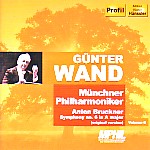Günter Wand “only” recorded this symphony three times, once in Cologne and twice with his own NDR orchestra, and all of those versions were pretty terrific. So is this one. Perfectly paced, effortlessly flowing (no small feat), and impressively played by the brass section, Wand doesn’t miss a trick. In the first movement he times the arrival of the recapitulation as well as anyone ever has. The coda is simply magnificent. He gets the strings to really sing rapturously in the climaxes of the Adagio and relishes the scherzo’s quirky half-lights. He’s also one of the few conductors who doesn’t make an anti-climax out of the finale, particularly in its latter stages. The final peroration brings the music home in tremendously satisfying fashion, the trombones blasting out the first movement’s principal theme with self-evident pride. The 1999 sonics are quite good, though a touch on the harsh side in fortissimos. There are a few minor coughs and rustles from the audience, but nothing distracting. If you missed Wand’s last RCA recording with the NDR Symphony, this one is no less distinguished, and quite possibly easier to find. Buy with confidence.
































